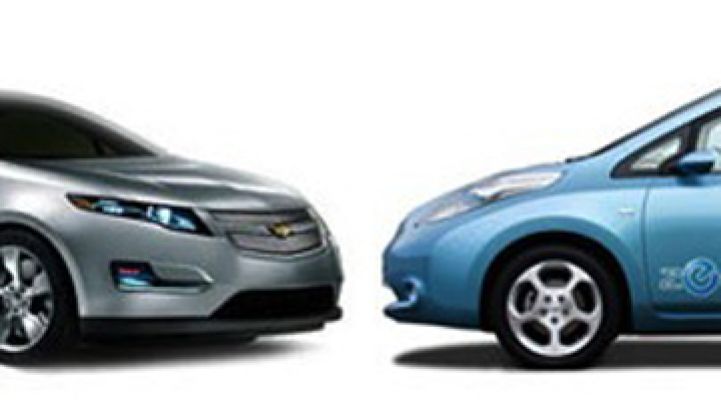California-based startup Vision Fleet took a couple of pages out of the clean energy sector’s playbook to make low-carbon, alternative-fuel vehicle fleets cheap and easy to operate.
Vision Fleet unveiled an innovative new contract model this week, which it calls the Clean Mile Solution. The model was inspired by business practices that transformed the solar and energy efficiency industries: power-purchase agreements (PPAs) and energy service companies (ESCOs).
Much like solar and energy-efficiency projects a decade ago, one of the main factors inhibiting the purchase of electric vehicles (EVs) today is their high upfront cost, even though they pay for themselves over time through operational savings. Last year, just three of every 1,000 vehicles purchased in the fleet market was electric.
PPAs and ESCOs take away the upfront cost issue and reduce the customer risk associated with new technologies by financing clean energy projects over time. Since the contract models were introduced, the adoption of solar and efficiency products has gone up dramatically.
So why not do the same thing for EVs?
Vision Fleet’s Clean Miles Solution uses a total-cost-of-ownership approach that bundles together and guarantees all the expenses of purchasing, operating and fueling an alternative fuel vehicle. The customer pays a set fee to use the vehicles, never owning them outright.
“We expect this model to transform the market for alternative fuel vehicles in fleets,” said Michael Brylawski, CEO of Vision Fleet. “Suddenly, public fleets can achieve ambitious alternative fuel goals quickly and save money simultaneously.”
Deployment in Indianapolis
Using the Clean Miles Solution, the city of Indianapolis announced Tuesday it will deploy 425 plug-in electric vehicles in its non-police fleet by early 2016 -- the largest-ever deployment of electric vehicles in a U.S. public fleet. In 2012, Indianapolis became the first city in the U.S. to pledge to convert its city fleet to post-oil technology by 2025 under an executive order by Republican mayor Gregory Ballard.
“This is a landmark step in revitalizing our aging fleet and replacing expensive internal combustion engine vehicles with cutting-edge EV technology, all while reducing our dependence on oil and saving Indianapolis taxpayers thousands in fuel costs each year,” said Mayor Ballard, in a statement.
Unlike a solar or efficiency project that developers can essentially set and forget, there’s a lot of complexity to operating vehicles. To guarantee that EVs will have a total cost of ownership that’s cheaper than gasoline-powered cars, Vision Fleet studied Indianapolis’ existing fleet using on-board telematics for several months. This analysis alone allowed the city to cut 100 unnecessary vehicles from its fleet.
Vision Fleet also installed a custom-built telematics and analytics platform, Vision Fleet iQ, in each of its EVs as part of the Clean Miles Solution. The platform helps a fleet to right-size vehicles to a particular task, enables reimbursement for at-home charging of take-home vehicles, and is able to track behavioral data. Similar to Opower's platform for utility customers, Vision Fleets shares data with fleet drivers to help them drive more efficiently, either by changing routes or speeds, or charging at different times.
These capabilities help to maximize the number of electric miles and substantially reduce the costs to deploy electric vehicles by increasing driving fuel efficiency and plug-in rates, as well as reducing both the number of vehicles required and charging infrastructure needs. By transitioning a mile traveled on gasoline to electricity, the fuel savings can be as much as 80 percent, according to Vision Fleet.
Each gasoline-powered sedan in Indianapolis’ fleet would have cost taxpayers approximately $9,000 per year over the next decade, including purchase, fuel, maintenance and insurance. The new plug-in vehicles will cost approximately $7,400 per year, saving taxpayers $1,600 per vehicle.
Indianapolis signed a $32 million, seven-year contract with Vision Fleet. But in switching to a mix of pure electric and plug-in hybrid vehicles, including the Nissan Leaf, the Chevrolet Volt, and the Ford Fusion Energi, the city expects to save 2.2 million gallons of gasoline and $8.7 million over the next ten years.
Vision Fleet will continue to roll out and monitor EVs in Indianapolis over the next year. The startup, backed by the Colorado-based, sustainability-oriented investment firm Vision Ridge Partners, is also working with the state of Colorado on a full assessment of its vehicles to find opportunities for alternative-fuel vehicle adoption. Vision Fleet is actively seeking to deploy its innovative contract model with other government fleets.



